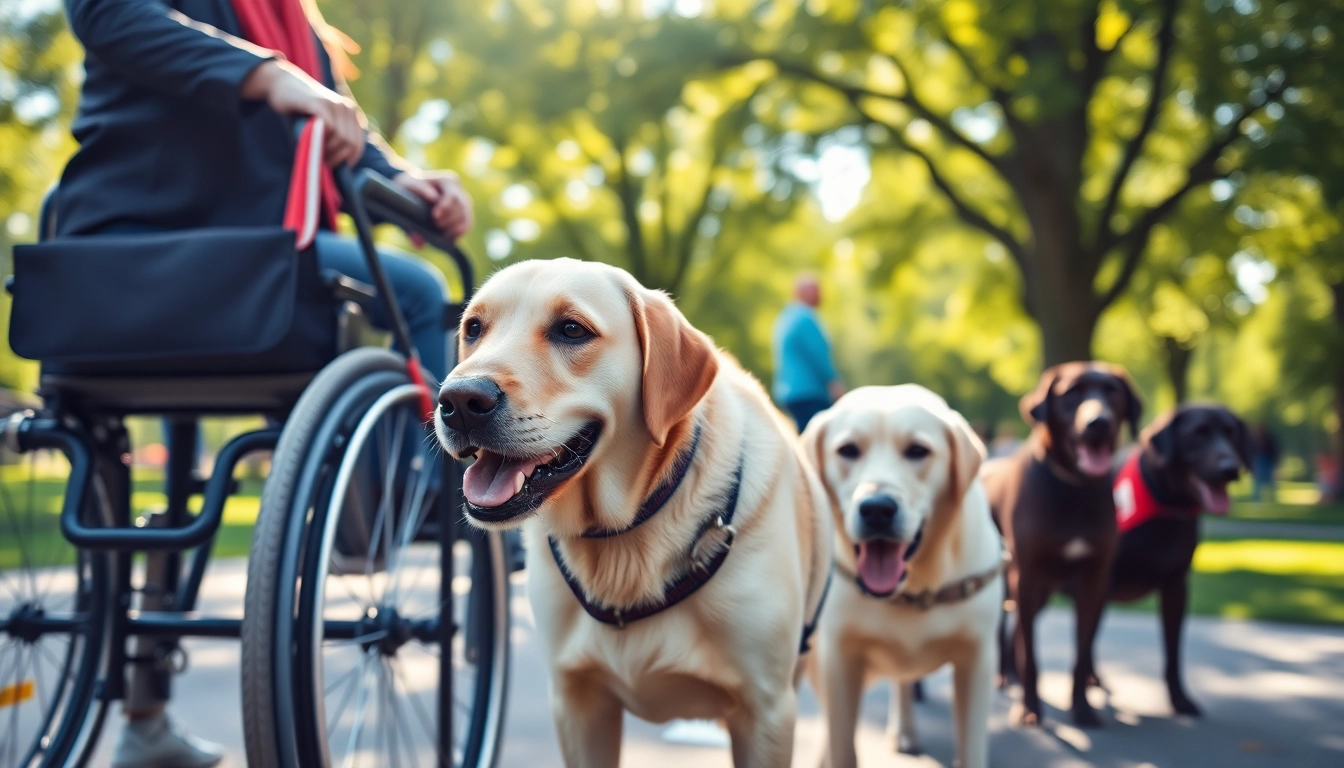When it comes to the unique companionship and support provided by service dogs, understanding their purpose and the various options available for individuals seeking to enhance their quality of life is crucial. This article provides an exhaustive look into service dogs for sale, guiding potential owners through everything from understanding what a service dog is, to where to find trained dogs, and the financial aspects involved in acquiring one.
Understanding Service Dogs
What Defines a Service Dog?
A service dog is defined by its unique ability to assist individuals with disabilities in performing tasks and activities of daily living. The Americans with Disabilities Act (ADA) describes service dogs as specially trained to perform tasks for a person with a disability. These tasks can range from guiding individuals with visual impairments to alerting individuals with hearing impairments to sounds, and even providing support for those with conditions such as PTSD, epilepsy, or diabetes.
Importantly, service dogs are not considered pets. They are working dogs whose primary purpose is to provide assistance to their handlers. This distinction means that they have specific legal rights, including the right to accompany their handlers in public places where pets are not allowed.
Types of Service Dogs Available
Service dogs come in various types, each trained for specific tasks related to different disabilities:
- Guide Dogs: These dogs assist visually impaired individuals by navigating obstacles and helping them move safely in various environments.
- Hearing Dogs: They alert handlers to important sounds, such as a doorbell, smoke alarm, or phone ringing, enhancing the safety and independence of individuals with hearing loss.
- Mobility Assistance Dogs: These dogs aid individuals with mobility-related challenges by providing physical support, fetching objects, or helping stabilize their handler while walking.
- Medical Alert Dogs: Trained to sense medical conditions like seizures or severe allergic reactions, these dogs can alert their owners or others to take necessary actions when needed.
- Psychiatric Service Dogs: These dogs provide support for individuals with psychiatric disorders such as anxiety, depression, phobias, or PTSD by providing comfort, grounding, and aids through anxiety attacks.
Benefits of Having a Service Dog
The benefits of having a service dog extend beyond physical assistance. Here are some key advantages:
- Independence: Service dogs allow individuals to carry out their daily activities with greater ease and confidence, promoting independence and self-sufficiency.
- Emotional Support: The presence of a service dog can deliver emotional comfort and companionship, reducing feelings of loneliness, anxiety, and depression.
- Enhanced Quality of Life: Service dogs improve the overall quality of life by helping their handlers engage with the world around them and perform everyday tasks.
- Increased Safety: With their training, service dogs help mitigate risks associated with certain disabilities, contributing to the overall safety of their handlers.
Factors to Consider Before Buying Service Dogs for Sale
Assessing Your Personal Needs
Before purchasing a service dog, it’s critical to assess your specific needs. Consider the following factors:
- Type of Disability: Identify the nature of your disability and how a service dog can assist you. Different dogs are trained for different tasks, so determine what specific assistance would benefit you the most.
- Living Situation: Evaluate your living environment to ensure it can accommodate a service dog. This includes considering space for the dog and whether your home is pet-friendly.
- Activity Level: Consider your lifestyle. Different breeds and types of service dogs have varying energy levels and requirements; ensure the dog you choose matches your activity level.
Understanding Training and Skill Levels
Not all service dogs are alike, and their training can significantly influence their capabilities:
- Basic Obedience: All service dogs should undergo foundational training to respond to commands and behave appropriately in public.
- Specialized Training: Depending on the specific needs of the owner, dogs may require advanced training to handle particular tasks related to their handler’s disability.
- Ongoing Training: After the initial training, some dogs may require continued education or refinement of specific skills to remain effective.
Evaluating Health and Temperament
The health and temperament of a dog are crucial to its effectiveness as a service animal. Here’s what to consider:
- Physical Health: Ensure the dog is in good health, with no underlying conditions that could affect its ability to perform necessary tasks.
- Temperament: Look for qualities such as calmness, sociability, and a strong desire to work with humans. A good service dog must be well-suited for a variety of environments.
- Age: Puppies require significant training and socialization, while older dogs may have the training already but could be less energetic.
Where to Find Quality Service Dogs for Sale
Reputable Breeders and Training Programs
Finding a quality service dog begins with reputable breeders or training organizations. Here are steps to guide your search:
- Research Breeder Background: Look for breeders with a history of producing service dogs, reviewing their training programs and success stories.
- Ask for References: A trustworthy breeder should be willing to provide references from previous clients who have successfully trained service dogs.
- Visit Facilities: If possible, visit the breeding or training facility to observe the conditions in which the dogs are raised and trained.
Rescue Options for Service Dogs
Rescue organizations can be excellent sources for acquiring service dogs. Consider the following:
- Credibility of Rescue Organizations: Ensure the organization is reputable, focusing on the training of dogs for specific tasks matching your needs.
- Customization: Many rescues have trained dogs that have already undergone socialization and basic training, making them suitable candidates for service work.
- Pending Assessments: Some dogs may require skill evaluations to determine their suitability for service roles, which should be carried out by trained professionals.
Online Marketplaces: Pros and Cons
Online marketplaces may offer a wide variety of options for service dogs; however, exercising caution is essential:
- Pros:
- A variety of choices are often available at competitive prices.
- Access to national and international selections.
- Cons:
- Inconsistent quality and varying training standards can pose risks.
- Challenges in verifying the health and temperament of the dogs available online.
Training and Certification for Service Dogs
Overview of Training Requirements
Service dog training typically encompasses several stages:
- Basic Socialization: Young service dogs should be exposed to various environments, people, and situations to build comfort in public spaces.
- Obedience Training: Commands such as sit, stay, come, and heel are essential for a well-trained service dog. This training lays the foundation for further specialized tasks.
- Task-specific Training: After mastering basic obedience, dogs undergo specialized training that directly relates to the tasks that they will perform for their handler.
Certification Process Explained
Certification is a key aspect that helps ascertain a service dog is ready for its role. Generally, certification involves:
- Assessment by Professionals: Trained evaluators assess the dog’s abilities, behavior, and overall suitability for service tasks.
- Documentation: Certification often requires documentation attesting to the dog’s training and health, which can be critical for legal purposes.
How Training Affects the Cost
The cost of acquiring a service dog can vary significantly based on training and certification:
- Initial Acquisition Cost: Costs can range from a few hundred to several thousand dollars depending on the dog’s training level.
- Ongoing Costs for Training: Consider the potential costs associated with ongoing training, continuous education, and possible certifications that may require renewals.
Cost Considerations for Service Dogs for Sale
Factors Influencing the Price
Several factors may influence the final price of service dogs:
- Type of Training: Highly trained service dogs specializing in unique tasks often cost more due to the extensive training involved.
- Breeding and Genetics: Dogs from a pedigree with a successful track record for service work may come with a premium price.
- Location: Prices may differ based on geographic demand and supply; urban areas may have higher prices compared to rural settings.
Financial Assistance and Resources
Affording a service dog can be challenging, but various resources can assist:
- Grants and Financial Aid: Organizations may provide grants specifically for acquiring service dogs or subsidizing care costs.
- Nonprofit Programs: Some nonprofits offer low-cost or free service dogs, although with a waiting list in many cases.
- Tax Deductions: Expenses incurred with service dogs may qualify for tax deductions, providing further financial relief.
Long-term Care and Maintenance Costs
Once you bring a service dog home, ongoing costs need consideration:
- Healthcare: Regular veterinary visits, vaccinations, and potential medical needs influence the overall expense.
- Nutrition: Quality dog food can be a significant recurring cost, with larger breeds requiring more than smaller ones.
- Training Refreshers: Periodic training as your needs evolve and to maintain the dog’s skills can add to ongoing costs.
In summary, the journey to finding and acquiring a service dog is filled with important considerations and choices. It’s essential to assess personal needs, understand the varieties of service dogs available, and evaluate responsible sourcing options. With the right information and a thorough approach, finding the perfect service dog can profoundly impact an individual’s quality of life, leading to newfound independence and joy.



